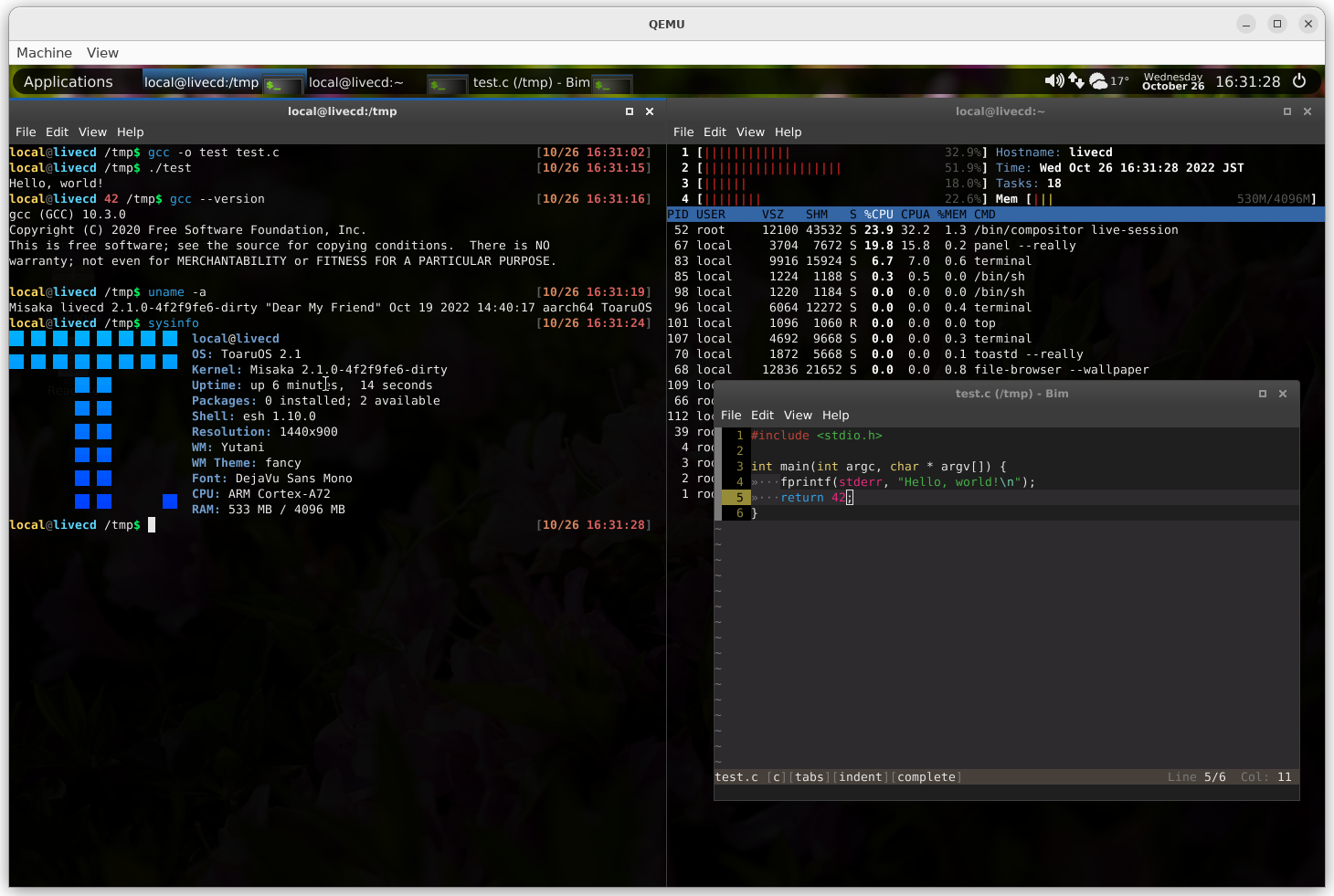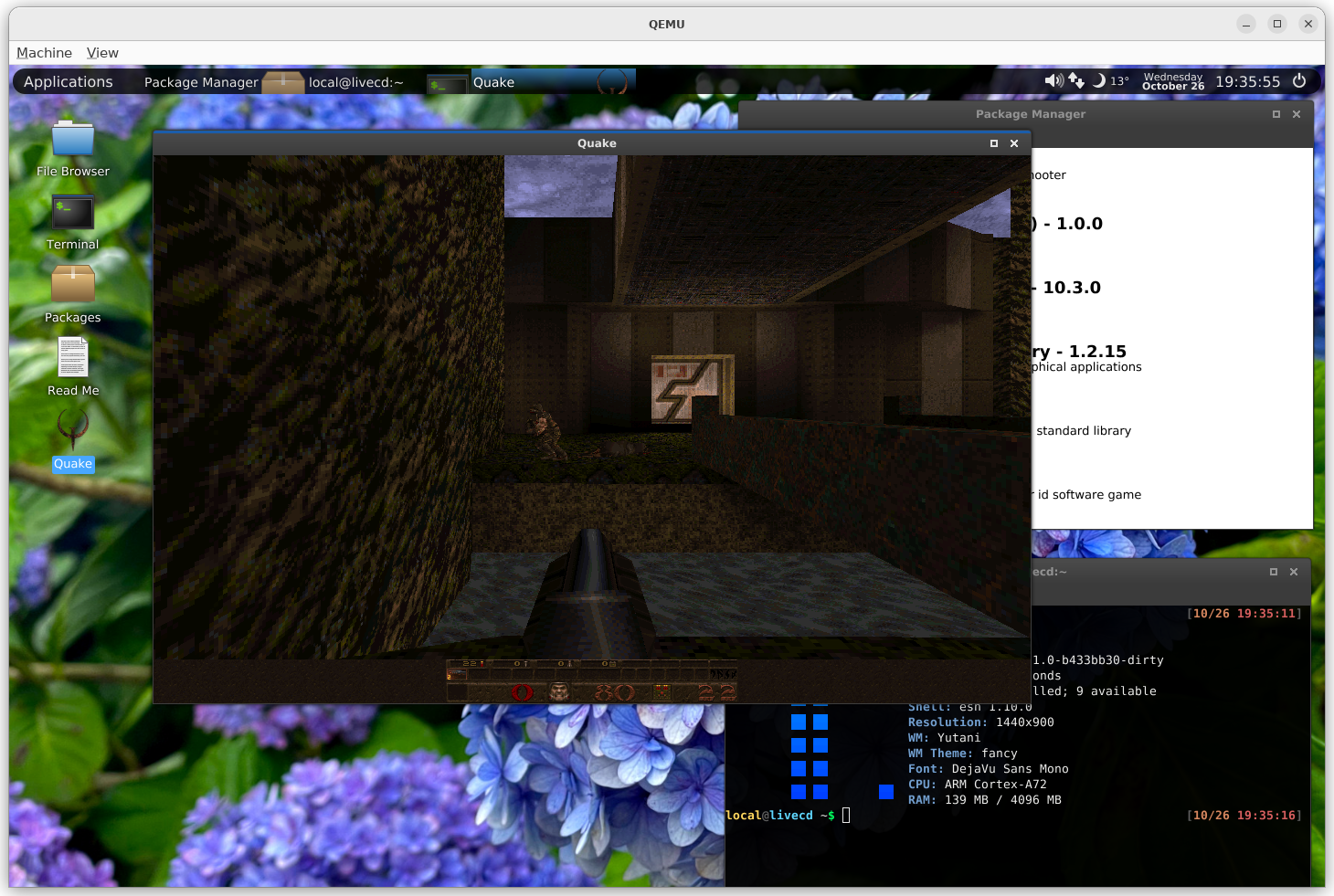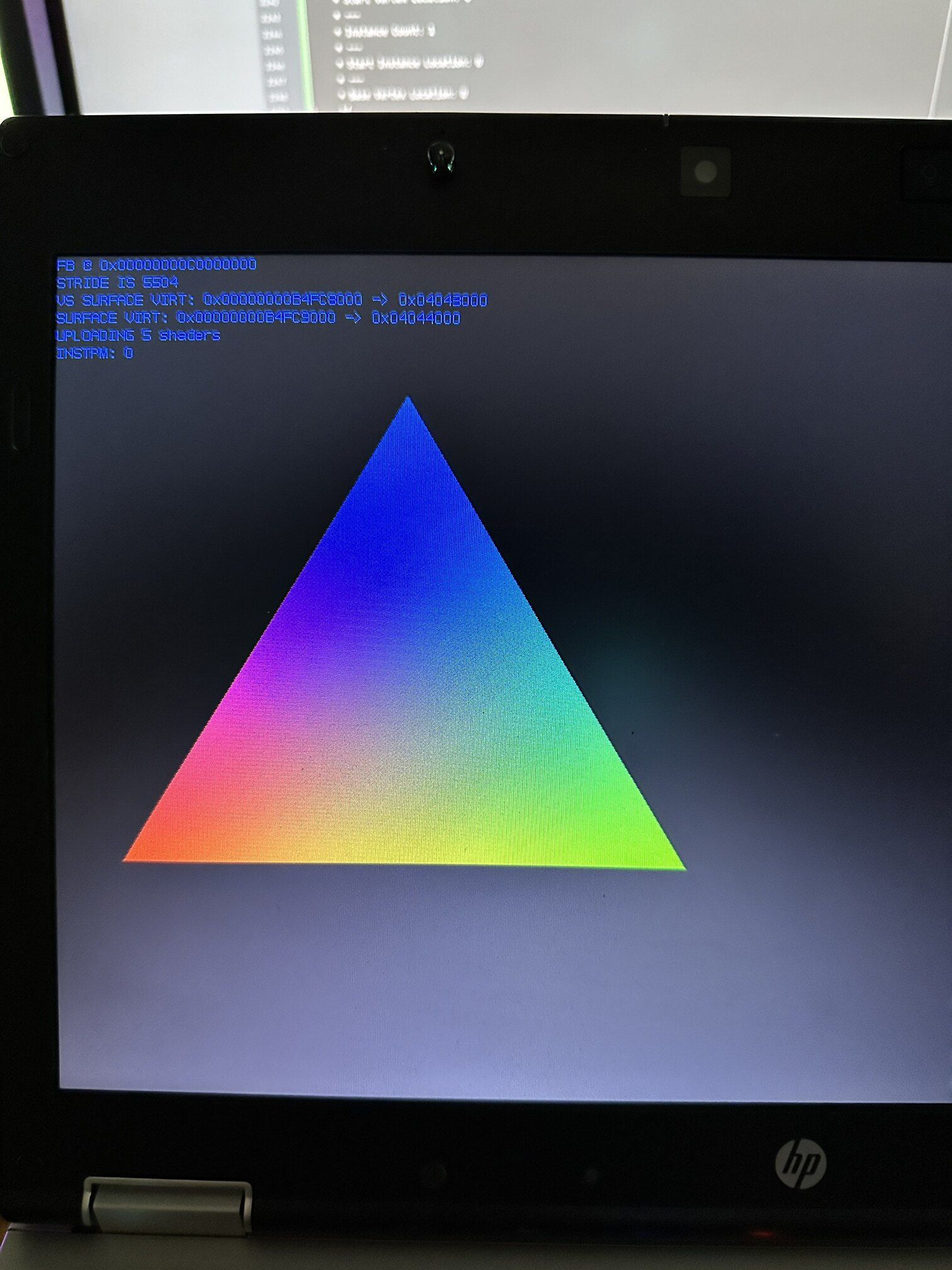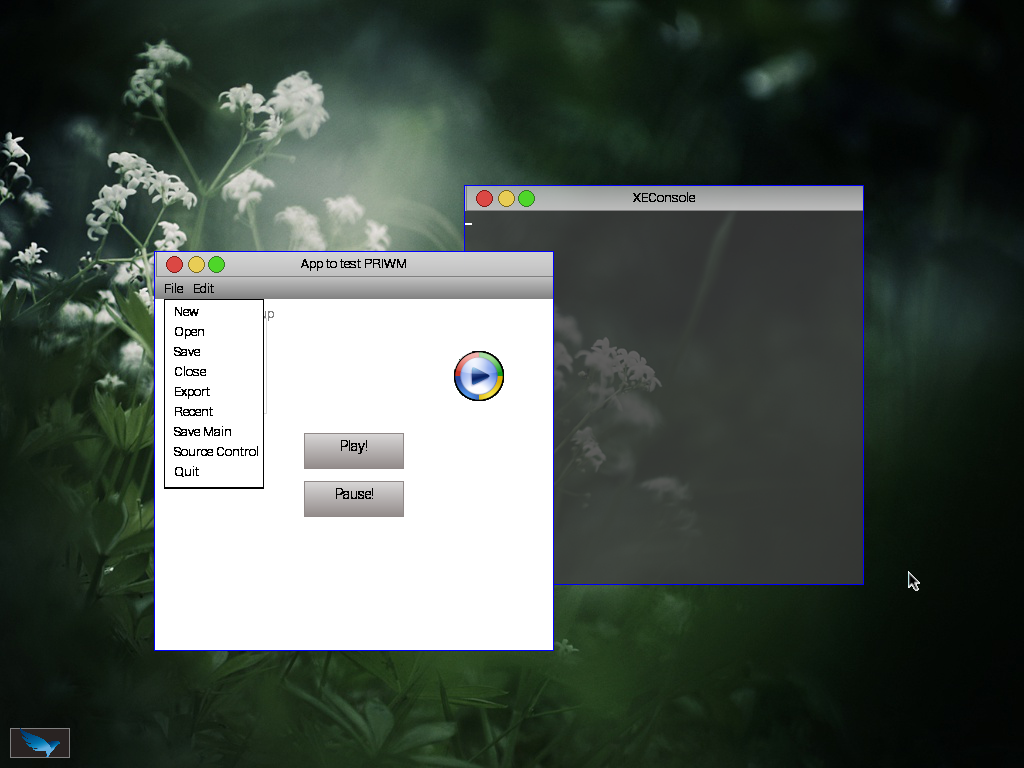As far as I know, that's the default background generated by X itself when nothing else is running.max wrote:That wallpaper is burning my eyesBut awesome to see something like Xorg running. How big are the requirements for that?
What does your OS look like? (Screen Shots..)
Re: What does your OS look like? (Screen Shots..)
Writing a bootloader in under 15 minutes: https://www.youtube.com/watch?v=0E0FKjvTA0M
Re: What does your OS look like? (Screen Shots..)
Yes, it is. It is the Xorg logo, pretty tiny and then tiled across the screen. The pattern is pretty good at making flaky CRTs produce visible errors, which is probably why they've kept it.BigBuda wrote:As far as I know, that's the default background generated by X itself when nothing else is running.
Carpe diem!
- AndrewAPrice
- Member

- Posts: 2311
- Joined: Mon Jun 05, 2006 11:00 pm
- Location: USA (and Australia)
Re: What does your OS look like? (Screen Shots..)
I switched my UI over to being rendered with Skia, which was a huge project that involved porting fontconfig, freetype, etc., implementing memory mapped files (so fontconfig wouldn't be so slow). But, Skia is allowing me to do things that would have been harder in a bespoke graphics library, such as curved buttons. I'm using this as an opportunity to create prettier UI widgets.
I'm using Yoga behind my widget framework which is a flexbox layout engine. Here's my
calculator code if you want an idea of what my API looks like.
I'm using Yoga behind my widget framework which is a flexbox layout engine. Here's my
calculator code if you want an idea of what my API looks like.
My OS is Perception.
Re: What does your OS look like? (Screen Shots..)
It's been a busy week, full of bugs.
I implemented a v86 monitor and added support for VBE mode switching.
I implemented a v86 monitor and added support for VBE mode switching.
OS: Basic OS
About: 32 Bit Monolithic Kernel Written in C++ and Assembly, Custom FAT 32 Bootloader
About: 32 Bit Monolithic Kernel Written in C++ and Assembly, Custom FAT 32 Bootloader
-
Peterbjornx
- Member

- Posts: 116
- Joined: Thu May 06, 2010 4:34 am
- Libera.chat IRC: peterbjornx
- Location: Leiden, The Netherlands
- Contact:
Re: What does your OS look like? (Screen Shots..)
TWM! I'm always surprised how nostalgic I get at the sight of it. 
 Some love it, others hate it. I like to see it, but not for long. If I were writing a 16-bit OS, I'd use GEM's weave pattern. As for system requirements, I suffered a lot of crashes running X/twm/xterm in 4MB with 4MB swap, but very few when I increased swap to 8MB. This was with a Cyrix graphics card; I imagine XFBdev will use a bit more for in-memory image data. It's possible modern X wants far more memory for reasons I'm not clear on.
Some love it, others hate it. I like to see it, but not for long. If I were writing a 16-bit OS, I'd use GEM's weave pattern. As for system requirements, I suffered a lot of crashes running X/twm/xterm in 4MB with 4MB swap, but very few when I increased swap to 8MB. This was with a Cyrix graphics card; I imagine XFBdev will use a bit more for in-memory image data. It's possible modern X wants far more memory for reasons I'm not clear on.
@AndrewAPrice: looking good!
X's default "root weave" (as it has come to be called) is as divisive as Marmite, I think.max wrote:That wallpaper is burning my eyesPeterbjornx wrote:Xorg (or rather, Kdrive/Xfbdev) running on my OS, hosting TWM.
But awesome to see something like Xorg running. How big are the requirements for that?
@AndrewAPrice: looking good!
Kaph — a modular OS intended to be easy and fun to administer and code for.
"May wisdom, fun, and the greater good shine forth in all your work." — Leo Brodie
"May wisdom, fun, and the greater good shine forth in all your work." — Leo Brodie
Re: What does your OS look like? (Screen Shots..)
In preparation for releasing ToaruOS 2.1, I have completed packaging of aarch64 builds of several ports, including gcc, binutils, SDL1.2, Quake (sdlquake), and Doom (doomgeneric, which I added a ToaruOS backend to some time ago).
While the hardware setup for the VM is rather esoteric, including the Bochs display device and Intel audio chipset and NIC (I swear I'll get around to a virtio-net driver eventually...), the aarch64 builds work in QEMU with essentially full functionality and have been tested under HVF on an M1 Mac.


While the hardware setup for the VM is rather esoteric, including the Bochs display device and Intel audio chipset and NIC (I swear I'll get around to a virtio-net driver eventually...), the aarch64 builds work in QEMU with essentially full functionality and have been tested under HVF on an M1 Mac.


-
Peterbjornx
- Member

- Posts: 116
- Joined: Thu May 06, 2010 4:34 am
- Libera.chat IRC: peterbjornx
- Location: Leiden, The Netherlands
- Contact:
-
RobertMiller
- Posts: 2
- Joined: Sat Oct 22, 2022 2:37 pm
- Libera.chat IRC: RobertMiller
Re: What does your OS look like? (Screen Shots..)
@Peterbjornx your screen short looks unique to me. 
- Thunderbirds747
- Member

- Posts: 83
- Joined: Sat Sep 17, 2016 2:14 am
- Location: Moscow, Russia
Re: What does your OS look like? (Screen Shots..)
Impressive. How did you port the classic Windows UI into a 386 DOS OS?min0911 wrote:
Coffee is not airplane fuel.
Re: What does your OS look like? (Screen Shots..)
Not really an OS, but an experiment with 3D graphics using a real GPU.
Bare metal intel GPU 3D pipelined triangle, took absolutely enormous amount of effort and debugging.
Next stop is spinning cube.

Bare metal intel GPU 3D pipelined triangle, took absolutely enormous amount of effort and debugging.
Next stop is spinning cube.

Last edited by 8infy on Thu Nov 24, 2022 3:26 pm, edited 1 time in total.
Re: What does your OS look like? (Screen Shots..)
Yeah, GPU programming sucks but it's worth it once you see pixels on the screen.8infy wrote:Not really an OS, but an experiment with 3D graphics using a real GPU.
Bare metal intel GPU 3D pipelined triangle, took absolutely enormous amount of effort and debugging.
Next stop is spinning cube.
Are you like using OpenGL or are you doing it directly, sending packages and whatnot?
Please fix the link, we (I) want to see it.
OS: Basic OS
About: 32 Bit Monolithic Kernel Written in C++ and Assembly, Custom FAT 32 Bootloader
About: 32 Bit Monolithic Kernel Written in C++ and Assembly, Custom FAT 32 Bootloader
Re: What does your OS look like? (Screen Shots..)
No, it's a bare metal kernel, cannot use OpenGLOctacone wrote: Yeah, GPU programming sucks but it's worth it once you see pixels on the screen.
Are you like using OpenGL or are you doing it directly, sending packages and whatnot?
It's building a batch buffer that sets up a 3D pipeline with a bunch of shaders and the triangle vertices.
The batch buffer is placed on the command ring of the render engine, which then executes all the pipeline stages like VF->VS->GS->CS->SF->PS,
which outputs the final shaded triangle to the mapped pixel shader surface (which also happens to be the primary plane of the display).
Thanks, fixedOctacone wrote: Please fix the link, we (I) want to see it.






